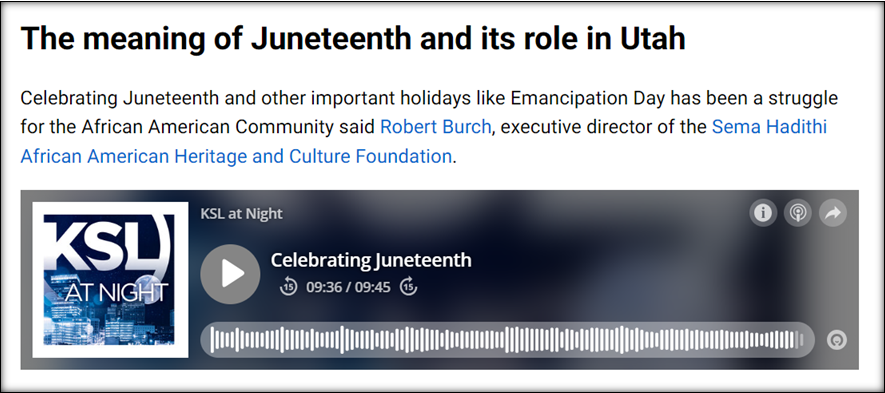Juneteenth in Utah: From Overshadowed to State Holiday
Celebrating Juneteenth and other important holidays like Emancipation Day has been a struggle for the African American Community said Robert Burch, executive director of the Sema Hadithi African American Heritage and Culture Foundation.
BY CLAYRE SCOTT
KSLNewsRadio
SALT LAKE CITY — Monday marks the second time Juneteenth will be celebrated as an official state holiday in Utah. Though Juneteenth has been a widely celebrated holiday for over a century, it wasn’t until June 17, 2021, that President Joe Biden signed a bill into law making Juneteenth a federal holiday. Gov. Spencer Cox signed a bill the following year, making Juneteenth National Freedom Day a state holiday in 2022.
The History of Juneteenth
Juneteenth, short for June 19, commemorates the end of slavery in the United States. President Abraham Lincoln signed the Emancipation Proclamation on Jan. 1, 1863.
However, it wasn’t until two years later, on June 19, 1865 that news reached the last of those enslaved in Texas.
Celebrations ensued, and official Juneteenth commemorations began the next year in Texas. As years passed, the holiday followed Black people as they migrated across the U.S., making Juneteenth the longest-running African American holiday.
Early celebrations of this holiday reflect those seen today. Events range from barbecues to religious services to festivals with parades, dancing, food, and all genres of music. But beyond the fun, events, and a day off from work, Juneteenth is a piece of U.S. history.
The Meaning of Juneteenth and its Role in Utah
Celebrating Juneteenth and other important holidays like Emancipation Day has been a struggle for the African American Community said Robert Burch, executive director of the Sema Hadithi African American Heritage and Culture Foundation.
He told KSL at Night that Juneteenth often competed with “what the larger American community wanted.” Because of this, even when African Americans wanted to celebrate Emancipation Day, they would often just celebrate the Fourth of July with the rest of the country.
Burch said despite this, they never gave up on their intent to commemorate the holiday.
“We just keep persisting and hoping people catch up and catch on,” he continued. “Certainly happy to teach it to them too so that they understand the significance of the holiday.”
The state of Utah began celebrating Emancipation Day as far back as 1890. But conflicts with the Fourth of July led to it slowly fading away. Burch said that it wasn’t until near the late 1980s that the Black community began to celebrate Juneteenth once again.
“Here in Utah, we generally celebrate the entire month,” he said.
Research Black History in Utah
There are many ways to celebrate Juneteenth in Utah. Burch said one way is by learning the stories of descendants of the enslaved who have lived in this state. Gathering these stories is what Burch set out to do through his historical organization, Sema Hadithi — which means to “tell the story.”
“We ran into a lot of stories about there being no black history in Utah,” he explained. “At the same time talking to black and white families who have had kinfolk all the way back to 1847 here, so we know there must be some black history.”
Sema Hadithi is a foundation that tells the stories of Black life in Utah. The team conducts research and collects information to share with the community and educate others on the history of Black people in the American West. Their goal is to not only share this information but to create a space where others feel safe sharing their diverse family history.
“What we’ve been trying to tell folks,” he continued. “is that you change public history by making your family history public.”


